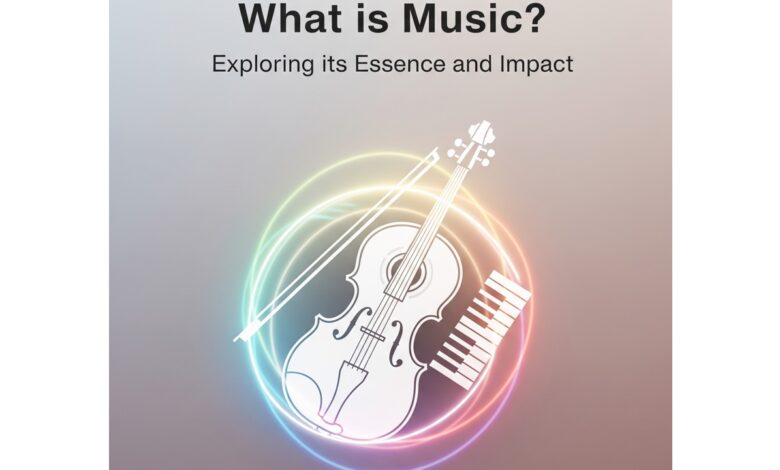What is Music? Exploring its Essence and Impact

Music is an art form using sound, expressing ideas, emotions, and stories through rhythm, melody, and harmony. It is a fundamental part of human experience, influencing mood, memory, and social connection. Understanding music’s role helps us appreciate its diverse forms and profound effects on individuals and communities.
How Does Music Influence Our Mood and Well-being?
The impact of music on mood is well-documented. Listening to upbeat tunes can elevate spirits, while calming melodies reduce stress. This emotional connection makes musical expression a powerful tool for self-regulation and personal growth. Many people use music for relaxation, focus, or to energize their day.
What Are the Key Elements of Musical Composition?
Musical composition involves several core elements working together to create a cohesive sound. These elements are essential for any piece of auditory art, from simple tunes to complex symphonies. They provide the framework for how sounds are organized and perceived.
| Element | Description | Impact on Listener |
|---|---|---|
| Rhythm | The arrangement of sounds and silences in time. It provides the beat and pulse of the music. | Creates a sense of movement, energy, or stability. Influences dancing and physical response. |
| Melody | A sequence of single notes that is musically satisfying. It’s often the most memorable part. | Evokes emotions, provides a narrative, and can be easily hummed or recalled. |
| Harmony | The combination of different notes played simultaneously to create chords and chord progressions. | Adds depth, richness, and emotional color to the music. Can create tension or resolution. |
| Timbre | The unique quality of a sound that distinguishes different instruments or voices. | Contributes to the overall texture and character of the music, influencing its emotional tone. |
| Dynamics | The variation in loudness or softness of a musical sound. | Creates expressive contrasts, emphasizing certain moments and shaping the emotional arc. |
Exploring Diverse Musical Genres: What Defines Them?
The world of musical genres is vast and continually evolving. Each genre has distinct characteristics, instruments, and cultural origins. From classical to contemporary, understanding these classifications helps in appreciating the breadth of global sounds and their historical contexts.
For instance, classical music often features orchestral arrangements and complex structures, while rock music typically emphasizes electric guitars and strong rhythmic beats. Electronic dance music relies heavily on synthesizers and programmed rhythms, perfect for vibrant atmospheres. Different genres cater to diverse tastes and offer unique listening experiences, reflecting various societal influences and artistic innovations. Exploring various genres can broaden your musical horizons and introduce you to new sonic landscapes.
How Does Technology Transform Music Creation and Consumption?
Technological advancements have revolutionized how music is made and enjoyed. Digital audio workstations (DAWs) allow artists to create intricate compositions from anywhere. Streaming services have made music access unprecedented, offering vast libraries at our fingertips. This shift has democratized creation and consumption, fostering new forms of musical discovery.
| Technological Impact | Description | Benefit for Users/Creators |
|---|---|---|
| Digital Audio Workstations (DAWs) | Software for recording, editing, and producing audio. Examples include Ableton Live, Logic Pro. | Enables home studio creation, precise editing, and complex layering for sound production. |
| Streaming Platforms | Services like Spotify, Apple Music, and YouTube offer vast catalogs for on-demand listening. | Convenient access to millions of songs, personalized recommendations, and easy music sharing. |
| Synthesizers and Samplers | Electronic instruments and devices that generate or manipulate sounds. | Expands the palette of available sounds, enabling unique textures and experimental audio design. |
What are the Benefits of Engaging with Music?
Engaging with music offers numerous benefits beyond entertainment. It can enhance cognitive function, improve memory, and even boost physical performance. Whether through listening, playing an instrument, or attending live performances, musical engagement enriches lives in meaningful ways. Many studies highlight music’s therapeutic effects, making it a valuable tool for mental wellness and emotional expression.
Why is Music a Universal Language?
Despite cultural differences, music’s ability to transcend barriers makes it a universal language. Its power to evoke shared emotions and foster connection is undeniable. A melody can convey sorrow or joy without words, creating understanding across diverse backgrounds. This universality underscores music’s profound human significance and its role in bringing people together.
Frequently Asked Questions About Music
A: Music affects our brains by activating various regions, including those involved in emotion, memory, and motor control. It can stimulate dopamine release, influencing pleasure and motivation. This neurological response explains music’s power to alter mood and enhance cognitive functions like problem-solving and focus.
A: Yes, certain types of music can improve focus and productivity, especially instrumental or classical pieces without distracting lyrics. Background music can create a conducive environment for concentration, helping to block out distractions and enhance performance on tasks. Many find ambient soundscapes particularly useful for sustained work periods.
A: Music’s role in cultures is diverse, serving purposes from religious ceremonies and celebrations to storytelling and social commentary. It reflects cultural identity, history, and values, often being central to rituals and community gatherings. Different cultures have unique musical traditions, instruments, and performance styles.
A: To start learning an instrument, choose one that interests you, consider taking lessons from a qualified instructor, and practice consistently. Beginning with basic theory and simple exercises builds a strong foundation. Many online resources and apps also offer beginner-friendly tutorials for various instruments.
References
- Psychology Today: Music Therapy
- Britannica: Music
- NPR: The Power of Music
